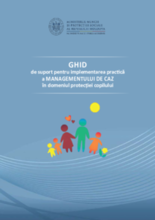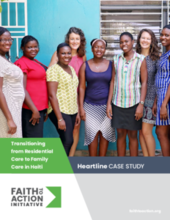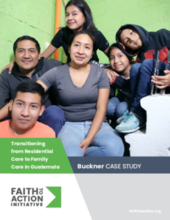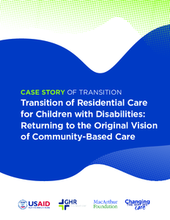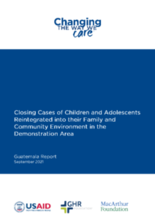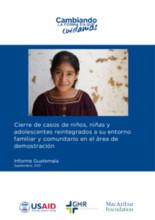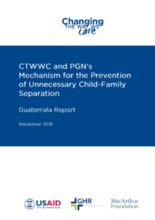The aim of this stage is to identify, locate and establish contact with each of the children’s family of origin, including extended family, for the purpose of exploring their reintegration prospects and options. Family tracing is a part of case management. In some transitions, the children’s family and their whereabouts are known, and tracing is not required. In other transitions, particularly where there is very little documentation and family contact has not been maintained, extensive tracing will be needed. It some cases, the status and/or whereabouts of children’s biological parents is known, however the status and/or whereabouts of extended family may not be known. Tracing becomes necessary in these cases where reunification with a parent may not be possible or where support from extended family might be required to enable reunification with a parent.
This stage is concerned with setting up the mechanisms for tracing and with implementing tracing efforts.
Activities that may occur during this stage include:
- Developing a family tracing strategy or action plan, including identifying key means of conducing tracing (using national records, databases, formal or informal networks, mass media, social media, working with government and community leaders), required resources (human and financial), developing budgets, staff and volunteer training needs and forms for documenting tracing efforts and progress.
- Developing family tracing SOPs that are in line with minimum standards or national family tracing protocols or requirements (which may determine timeframes and what is considered ‘exhaustive tracing’, influence procedures, stipulate involvement of local authorities, documentation, and referral mechanisms).
- Recruiting personnel
- Forming a generalized or specialized tracing team
- Conducting training on the family tracing SOPs, procedures and means of verifying details or information.
- Preparing caregivers/residential care facility staff ahead of commencing tracing efforts to garner their support and minimize the risk of obstruction of documentation
- Preparing children ahead of interaction with social workers/tracing staff, address concerns, listen to fears and answer questions
- Setting up supervision for tracing staff/volunteers
- Reviewing children’s files/ existing documentation and determining for which children tracing needs to occur and the scope of tracing efforts
- Consulting with children to determine their wishes with respect to tracing (this may not be necessary or appropriate in all cases)
- Conducting life story work with children to capture information to aid with tracing efforts
- Interviewing caregivers/ staff of the residential care facilities
- Documentation and analysis
- Conducting field-based tracing activities.
- Developing communication tools to aid with tracing efforts (posters, newspaper ads, radio ads social media posts etc.), taking into account confidentiality and safety.
- Verifying details (where parents/ extended family members have been identified/located)
Key milestones associated with this stage are:
- Family tracing system and procedures are established
- Tracing personnel have been identified and trained
- Children’s participation has been facilitated
- Status and whereabouts of family established for each child undergoing Reintegration.
Resources
Displaying 1 - 8 of 8
Ghidul de suport pentru implementarea practică a Managementului de caz în domeniul protecției copilului este destinat angajaților structurilor teritoriale de asistență socială.
The story of Heartline’s transition from residential care to family care is told in this recently released Faith to Action case study. The case study details their experience through three stages of transition—learning, preparation and planning, and full transition—with transparency. It addresses common challenges for transitioning organizations, as well as the strategies Heartline took to overcome them.
The story of Buckner Guatemala’s transition from residential care to family care is told in this recently released Faith to Action case study. The case study details their experience through three stages of transition—learning, preparation and planning, and full transition—with transparency. It addresses common challenges for transitioning organizations, as well as the strategies Buckner took to overcome them.
The Returning to Original Vision case story demonstrates reunification of children with disabilities as a critical step in transition. It also highlights the challenges of maintaining organizational vision within a process of transforming services.
The report is aimed at professionals in social work, psychology and pedagogy who work directly with children who are in the process of reintegration into a family and community environment. The document contemplates the process carried out for the closure of cases approached from a case management methodology. The report captures the experience that was had in Zacapa, Guatemala, and it reflects on the importance of reintegration through a planned process of case management and close accompaniment to families and caregivers.
El documento “Cierre de casos de niños, niñas y adolescentes reintegrados a un entorno familiar y comunitario en área de demostración” es un documento dirigido a profesionales de trabajo social, psicología y pedagogía que trabajan directamente en la atención a NNA que están en proceso de reintegración a un entorno familiar y comunitario, el documento contempla el proceso realizado para el cierre de casos abordado desde una metodología de gestión de casos, dentro del documento también se narra la experiencia que se tuvo en Zacapa, Guatemala y se reflexiona sobre la importancia de la reintegración a través de un proceso planificado de gestión de casos y de acompañamiento cercano a las familias y cuidadores.
This report includes the key lessons learned and the achievements resulting from CTWWC/PGN follow-up and family and economic strengthening activities provided to 18 families, along with information about 66 children and adolescents who remained with their family and community environment. The project also raised families’ awareness about the importance of providing children with safe and protective settings to foster their wellbeing through positive and loving parenting.
In this video, Dy Noeut and Kim Malin of New Smile Organisation (NSO) discuss their experience of conducting family tracing as a part of reintegration efforts in the context of an unregistered orphanage where children’s files contained missing and inaccurate information.

